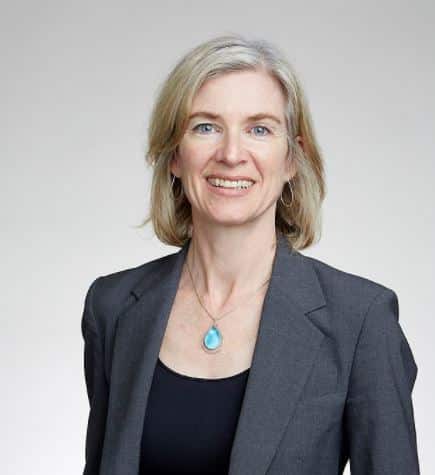Developer of Gene Editing Tool Discusses Ethics of Emerging Treatments

It was only nine years ago that researchers discovered a method for editing human genes using a specialized technology called the CRISPR-Cas9 tool.
CRISPR-Cas9 enables geneticists and medical researchers to edit parts of the genome by removing, adding or altering sections of the DNA sequence.
Ethicists, however, question whether such manipulation of the building blocks of life could cause future generations to suffer from unexpected mutations of an edited gene and a host of possible physical maladies as a result.
“There are absolutely ethical dilemmas in gene editing, some that are shared across medicine, and others that are novel because we haven’t fully grappled with the concept of changing the human genome until now,” said Jennifer Doudna, co-developer of the method for genome editing, in an email to The Well News.
In 2012 Doudna and Emmanuelle Charpentier, director at the Max Planck Institute for Infection Biology in Berlin, collaborated on adapting an earlier version of the CRISPR tool to cut specific sites of isolated DNA.
Afterwards “one of the first thoughts was how we might apply CRISPR to treat diseases like sickle cell disease. We had known the genetic basis [of the disease] for a long time, but never had the tools to address it,” Doudna said. “But we were quickly faced with a series of questions: How do we target specific cells in the body and make sure there are no unintended effects? How do we deliver CRISPR inside of those cells? How do we ensure that there is no immune response to the therapy?”
Doudna said that one of the appealing features of genome editing is that many of the steps to creating a treatment are the same whether you’re treating sickle cell disease, congenital blindness or any other genetic disease.
“The toolkit is the same, only the target in the genome changes. Like how the assembly line revolutionized auto manufacturing, the same type of thinking can be applied to developing CRISPR cures. Does the regulatory world think along those lines? No, not yet. Have we perfected all of the components for that assembly line? No, not yet,” Doudna said.
However before those questions could be fully answered, the technology had already begun to be used by scientists.
In 2013 researchers from the Broad Institute, a collaboration between Harvard University and MIT, started the process of using the CRISR-Cas9 tool in plants, animals and human cells.
It wasn’t until 2015 when the first report of genes edited in human embryos led by Junjiu Huang, a gene-function researcher at Sun Yat-sen University in Guangzhou, ignited a global debate about the ethics of using gene editing technologies.
In 2017, an advisory group formed by the National Academy of Sciences and the National Academy of Medicine endorsed gene editing but under the condition that it be used to treat only serious diseases and disability and only when no reasonable alternative exists.
In 2018, a Chinese biophysicist He Jiankui announced that twin girls, named Lulu and Nana, were born from embryos that he and his colleagues had edited to make them less susceptible to HIV.
The following year Jiankui and his colleagues were sentenced to three years in prison by the Shenzhen Nanshan District People’s Court and barred from working in reproductive technology based on the ethical issue of prematurely introducing a mutation that could potentially cause harmful effects and produce little benefit, as there was no significant risk of HIV.
Jiankui’s case prompted a group of more than 60 individual scientists, bioethicists, and biotechnology executives to call for a global moratorium on human clinical germline experimentation in a letter to the U.S. Department of Health and Human Services.
Beyond the therapeutic applications of the CRISPR-Cas9 tool, many scientists worry about the possibility of these treatments being used to enhance human traits, such as strength, or cognitive capacity, which can be done by targeting cells in adults or embryos.
“The ethics become less complicated when you focus on gene editing therapies in individuals, which is our focus at the Innovative Genomics Institute, as opposed to heritable gene editing,” said Doudna.
Doudna also raised the ethical question of who would have access and be able to afford to use the gene editing therapies.
“To my mind, the biggest and most pressing issues are accessibility and affordability, and those aren’t unique to genome editing at all. I worry about things like major medical advances that never see the light of day because they don’t fit someone’s business model or ones that can only be accessed by a certain privileged group of people,” Doudna said.
This year, researchers from Editas Medicine became the first in the US to use the CRISPR-Cas9 tool in humans to try to treat a rare form of blindness, and so far, the preliminary findings show promise of safety and efficacy in using the CRISPR tool as a potential treatment.
“The eye is interesting in part because it has less immune reactivity than other tissues, it’s small, and self-contained, so the thinking is that there is a lower risk of unwanted edits or immune responses,” Doudna said.
Doudna said researchers are also very close to a CRISPR-based cure for sickle cell disease, but that it is not affordable and they won’t be able to scale up the treatment to meet the need around the world without more refinements that bring the cost down.
“Over the next decade, we’ll see a number of new CRISPR-based cures. There’s more and more every year entering clinical trials but broad acceptance and availability will take additional time,” said Doudna.
“Nearly everyone has a mobile phone today but in the early days only a few people could afford them. I think a lot about how we can compress that time when it comes to CRISPR-based cures. You can wait for a mobile phone but people around the world don’t have that luxury when it comes to their health,” said Doudna.
Alexa can be reached at [email protected].
























